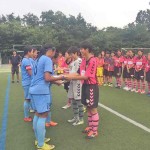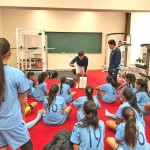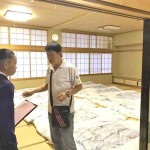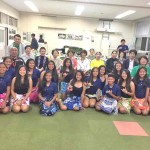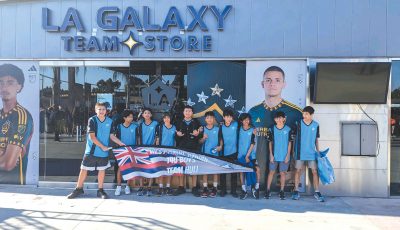CNMI women players reflect on training camp
- Members of the CNMI Women’s National Team exchange gifts with Japanese players before their friendly game at the Seisa Hakone Sengokuhara Sports Club. (Contributed Photo)
- Assistant coach Jimmy Tang gives instructions to the players, while head coach Luem Khen Koo looks on during one of the team’s training sessions at the Seisa Hakone Sengokuhara Sports Club. (Contributed Photo)
- CNMI Women’s National Team manager Angie Ito, left, and head coach Luem Khen Koo have a brief discussion before letting their players sleep on futons at the Tatami Room. (Contributed Photo)
- The CNMI Women’s National Team members pose for a photo with their Japanese hosts after performing a traditional dance and undergoing a sushi-making session. (Contributed Photo)
The lessons and experiences that members of the CNMI Women’s National Team got from their training camp outweighed the results of their series of matches in Japan.
The Commonwealth players lost all their friendly games during the training camp held from June 21 to 26, but still came out winners as they learned more about soccer, their squad and their teammates, their opponents, and their hosts and their admirable attitudes, values, and culture.
“When they (Japanese players) made mistakes, they didn’t put their head down and linger on these errors. Instead, they continue to play with their heads up and they even play stronger to win the ball back,” said CNMI player Grace Choi after they dueled Japan Football Association’s U15 Team, Toyo High School, and three teams from Seisa Hakone Sengokuhara Sports Club.
“Everyone is very disciplined and so respectful toward each other. From the start of the warm up to the time the teams have to go, there is always an utmost respect to the people, their equipment, and the facility,” added Jerlyn Castillo.
Elaine Enriquez seconded Castillo’s observations, as the former disclosed an unexpected moment for the team during one of their matches.
“We were amazed at how the referees and players bowed before the game when the players are being called at the court. We didn’t know what to do, a few of us did it, but the rest were lost, it was a funny moment for us. When Japanese players did substitutions, they bow before leaving the field and going into the field,” Enriquez said.
Self-discipline, team bonding
The visiting group had its training sessions and most of their friendly matches at the Seisa Hakone Sengokuhara Sports Club.
“It wasn’t a fancy place, but the staff members were very helpful and kind. We had to learn about time management—considering when we needed to go shower and for how long. It really felt like a soccer training camp. All the players were in a room, we had two, and it made us closer as a team because we had to work together to keep things neat and clean and monitor when to sleep and wake up,” Anela Duenas said.
“We slept on futons in the Tatami Room and it was fun to experience how the Japanese sleep in their rooms. Other players slept in bunk beds like the ones you usually see in training camps. But in our last evening in Japan, we all slept in one room and discussed the trip and our personal experiences. On bus rides, we also talk about each other and the team and how each game went,” Diana Maniacop added.
Every time the team had their trainings sessions at the sports club, they are reminded of the three principles Seida players, staff members, and officials follow: understand each other; leave nobody behind; and make friends.
“They inspire us to stick together as a team, never leave anyone behind. We have to help a teammate know what to do and where to go. We have to be on the same page,” Aira Ngalongalo said.
Love for soccer
The CNMI Women’s National Team players witnessed the Japanese passion for the sport when they watched a game at the famous Nissan Stadium.
“It was our first time to watch an official professional match between two great teams—Yokohama and Kobe. The crowd was loud and supportive. There are such a variety of people watching, from kids as young as 7 years old, to teenagers, probably similar to our age, and the adults, even the seniors—grandmothers and grandfathers. “It was so exciting and seeing the game made most of us feel that someday we want to play in a field like that, with a crowd that loud, but we will need to work so hard to be able to be in that kind of stage,” Diane Pablo said.
“We also went to the JFA Museum and it was mind blowing seeing the history of soccer there. I was amazed at seeing the first cleats, shin guards, and balls and how the uniforms looked like back then,” Jasmine Phan said.
Buckle down to work
After taking a few days of rest following their arrival from Japan, the Commonwealth players are back to the grind, trying to put into play what have they learned from the training camp.
“We did some self evaluation, watched footages of the games to see how we could get better,” said Britanny Wally.
Krizel Tuason added they need to improve their ball anticipation and think ahead of the game, while Duenas said each player is motivated to work harder to be in the first 11 of the team. Samantha Manacop, on the other hand, believes it is very important to forget their old habits and adopt the kind of discipline and dedication they saw from the Japanese players.
“We’ve seen what’s outside Saipan, how the game is played there and how the players work toward their goal, so it’s now up to us to do the same or better,” Choi added.
The CNMI Women’s Team’s training camp was made possible through Dove’s sponsorship of Northern Mariana Island Football Association’s women’s program and the assistance of the Japan Football Association and NMIFA president Jerry Tan. The group had the training camp to get ready for the 2018 EAFF Women’s Preliminary Round 1.
“We would like to thank Dove for their continued support and acknowledge NMIFA and JFA for providing great opportunities like this to our female players. The women’s football program in the CNMI grows stronger because of our partnership with generous companies like Dove and the leadership and commitment of our sports officials,” CNMI Women’s Team manager Angie Ito said.
“Soccer in the CNMI is more than just a sport. It also helps build up the players’ character and values. The training camp made our team members realize how Japan uses soccer as an instrument for players to become good citizens of their country by showing respect and discipline on and off the pitch,” Ito added. (PR)



